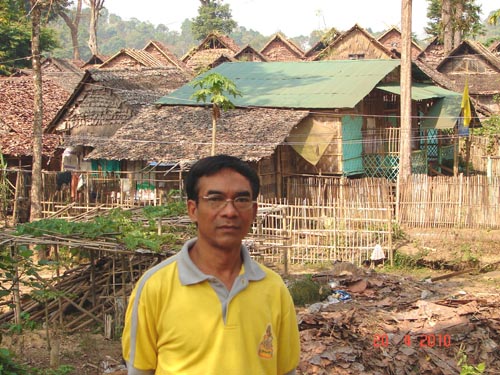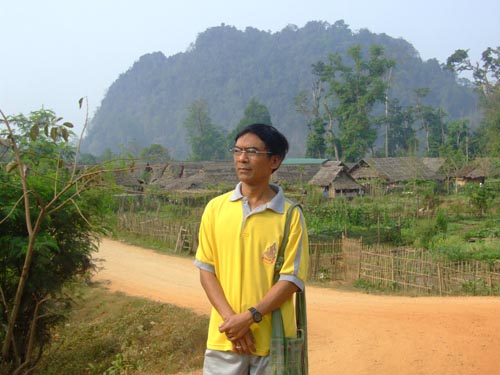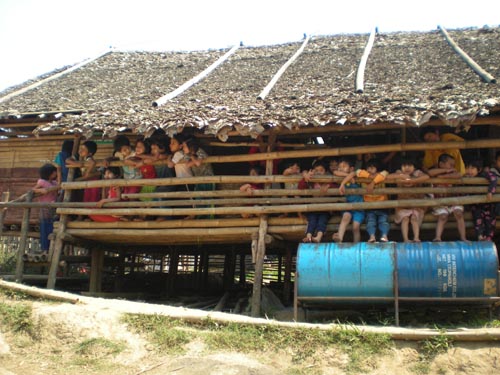“My life has become a living death”: An Interview with the Poet Khin Lunn
by Sampsonia Way / July 12, 2010 / 1 Comment
Translated by George Myo Zaw Mya

Khin Lunn, photo courtesy of the author.
In 1996, poet Khin Lun and a group of Burmese writers collaborated with activists in Thailand to publish a newsletter critical of the Burmese government. A year later, military intelligence agents began arresting those involved. Khin Lun was able to escape to Thailand, but two of his colleagues were arrested and sentenced to 8 years in prison.
In this interview conducted by a Burmese writer, the poet discusses how desperate one feels under persecution, the impact of exile on his writing, and his enduring desire to bring peace to Burma.
Why did you abandon Burma?
I abandoned Burma for many reasons. The first was the Burmese regime seized power in the September 1988 military coup. The regime muzzled the citizens’ freedoms of speech and prohibited their rights to organize guilds and associations. The regime not only prevented the transfer of power to the National League for Democracy (NDL) when they won the 1990 election, but it also obstructed all the rights of political parties like free speech, writing, and publishing.
The second reason was the military controlled all forms of media. By censoring, it harshly restricted citizens’ access to political news from around the world and in Burma. The regime also curtailed creativity in all kinds of art forms. The third reason was that I wanted to disclose the military regime’s violations and reveal the grim situation inside Burma to the citizens of the world.
When did you decide to go to Thailand?
In 1996-97 after contacting pro-democracy activists in exile in Thailand, I, along with my fellows, endeavored to create a news agency to expose the terrible conditions inside Burma. (We established the monthly MoJo Newsletter, which continues to circulate in the border area of Thailand.) Afterward military intelligence agents discovered our secret mission and began arresting the people involved. I was very fortunate and escaped, but my two fellows were arrested and sentenced to 8 years in prison. In 2004, they received International Press Freedom Awards (IPFA) from The Committee to Protect Journalists (CPJ).
What kinds of literary work did you create in Burma?
Mostly I have a deep affection for poems. My first poem was printed in 1975, but I occasionally wrote under several pen names short stories and articles related to literature, business, and sports, as well as articles for young people. I have been writing for 20 years.
After leaving Burma, how did your life as a poet change?
Abandoning my own country rewarded me with lots of unspeakable woe and great sorrows. Poets profoundly feel a great affection for the tradition, culture, and customs of their people’s and their motherland’s soul. They value human life above all and appreciate tranquil love among parents, siblings, and nature. I have been unable to find all of these things again.
Does that mean you don’t have contact with your family?
I have not tried to contact them. If the military regime discovers I have contacted them, they will persecute and imprison my old mother. There are many examples of the military mistreating the relatives of dissidents.
How has the democratic causes affected your writing?
Writing is not a priority in exile life. This is a great loss. I cannot be in a literary environment because I’m struggling for democratic causes. Also, losing contact with journals compiled in Burma hinders inspiration. The most crucial thing is I can no longer enjoy readers’ support, because I simply vanished from the public scene. A life without readers’ support is far worst than being isolated. In this situation, a writer’s life languishes. My life has become a living death.
Are there any benefits to exile?
There were some advantages when I got abroad. However, I don’t want to call it good. It cannot be said that for artists or writers abandoning your native land has advantages. I fled the country like a criminal, and the Thai government does not favor those who illegally enter the country. Living in Thailand, I have witnessed my fellow citizens of ethnic minorities repressed, murdered, and brutalized by successive military regimes. Therefore I deeply understand that the dictatorship must be completely annihilated from Burma.

Khin Lunn, photo courtesy of the author.
I have become more sympathetic towards Karens, who encounter human rights violations in the border areas and ethnic cleansing carried out by the military regime. I consider this sympathy a priceless treasure of a newly developed conscience. It is vital to create a country in which people from all walks of life live, enjoying peaceful coexistence. This perception became very much stronger than before. That it is a precious awareness.
I want to live in concord with the disunited ethnic groups and forge better relationships with them. I am ardently practicing this. It is a positive and fruitful benefit.
Where do you publish your work right now?
At first when I got abroad, I was occasionally allowed to write poems in journals compiled by Burmese dissidents groups. In 2001-02, Burmese living overseas started creating websites and using the Internet. Therefore, I got chances to write what I wanted to. In recent years, as new journals and magazines have been created, I have had more opportunities to take part.
Could you compare writing in Burma and writing in exile?
Writing in Burma was like fighting a duel with the authorities, competing with them on energy and intellect. Being able to write a story or an article was like a being a hero who stole jewels from a heavily guarded treasury. I went into indescribable ecstasy over my conquest. Still, when prohibition became stricter with the relentless heat of the censorship, new ideas and creativity couldn’t come into bloom.
In contrast, there is more freedom to write in a foreign country because I don’t have worry about being arrested. However, I have perceived another extreme: under the absolute freedom, creative writing sometimes turns into political statements with little literary merit.
At the present, how do you earn your living?
From 2001 to mid-2006, I volunteered as an editor for MoJo Newsletter. As it is a newspaper for a revolutionary cause and distributed free, I didn’t earn salary. After 2004, I applied for refugee status from the office of the United Nations High Commissioner for Refugees (UNHCR). In September 2006, I was transported with the UNHCR program to the Nupo Refugee Camp in the Thai-Burma border. Since then, I have been taking refuge in the camp.

A primary school at the refugee camp, photo courtesy of the author.
The refugees aren’t allowed to work in the camp, so there is nothing I can do. With food rations and a thatched house supplied by UNHCR, I live in a random way and I occasionally do writing.
As a Burmese poet, what is your strong desire in the future?
First of all, I want my country to be in peace. I desire to amicably live a tranquil and meaningful life, with amity among brothers from different peoples. My wish is to escape this prolonged vicious circle as soon as possible May shattered families and the terrible break between mothers, fathers, husbands, wives, and children come to an end!
My imperishable desires are to bring a lasting peace to Burma; to see my country play a role on the international stage; and to achieve national unity.





One Comment on "“My life has become a living death”: An Interview with the Poet Khin Lunn"
Trackbacks for this post